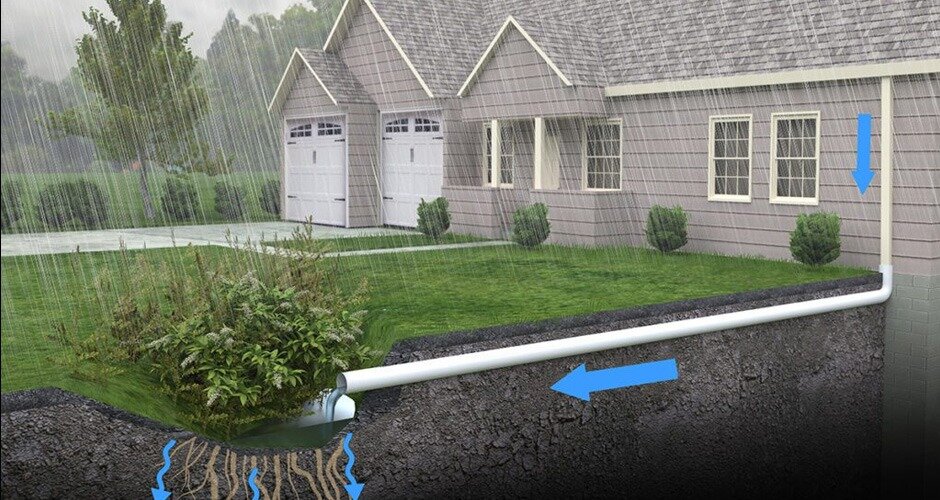When heavy rain hits, the last thing you want is pooling water around your property, risking structural damage and creating unsightly patches of mud and debris. A storm water pipe is designed to transport excess rainwater away from your property quickly and efficiently, protecting your landscape, foundation, and structures. But with various options available, knowing which type of storm water pipe best suits your needs can be challenging.
In this guide, we’ll delve into the different types of storm water pipes, what they’re used for, and which options are available to ensure your property remains safe, dry, and well-drained.
What Are Storm Water Pipes Used For?
Storm water pipes are specifically designed to channel rainwater away from buildings, driveways, and landscaped areas, directing it to appropriate drainage systems or storage areas. These pipes play a crucial role in preventing water pooling and erosion and reducing flood risks. Proper storm water management is vital for preserving your property and maintaining a safe and efficient drainage system.
Storm water pipes are often installed in various applications, including:
Residential properties: Used to divert water from roofs, driveways, and garden areas.
Commercial properties: Essential for large buildings, car parks, and landscaped areas that require extensive drainage solutions.
Municipal systems: Installed in public areas to control runoff and prevent flooding on streets and in parks.
Choosing the right storm water pipe for your property depends on factors like pipe material, durability, expected water flow, and compatibility with local regulations. Let’s explore the different types of storm water pipes available and how to choose the best option for your needs.
Types of Storm Water Pipes
Storm water pipes come in various materials and designs, each with its own strengths and ideal applications. Here are the primary types of storm water pipes commonly used in Australia:
1. PVC Storm Water Pipes
PVC (Polyvinyl Chloride) is one of the most popular choices for storm water pipes due to its durability, lightweight nature, and affordability. PVC pipes are resistant to corrosion and can handle moderate water flows, making them a preferred choice for residential applications.
Pros: Lightweight, easy to install, cost-effective, and corrosion-resistant.
Cons: Not suitable for high-impact areas or where heavy machinery is used, as they may crack under pressure.
IdealFor: Residential properties and smaller commercial applications with moderate water flow requirements.
PVC storm water pipes are often smooth on the inside, which helps to prevent blockages and ensures efficient water flow. If you’re looking for an affordable, easy-to-install solution for your home, PVC pipes are a solid choice.
2. Concrete Storm Water Pipes
Concrete storm water pipes are highly durable and built to handle significant water flow and external pressure. These pipes are often used in commercial and municipal drainage systems where long-term durability and strength are essential.
Pros: Extremely durable, resistant to heavy loads, and suitable for high-traffic areas.
Cons: Heavy and difficult to install; requires specialised equipment and professional installation.
IdealFor: Large commercial properties, industrial sites, and municipal drainage systems with heavy water flow and external loads.
Concrete pipes are available in both reinforced and unreinforced versions, depending on the load they need to bear. These pipes are ideal for areas where heavy vehicles or machinery frequently pass over, as they can withstand significant pressure without cracking.
3. HDPE (High-Density Polyethylene) Pipes
HDPE pipes are known for their flexibility, lightweight design, and resistance to corrosion and chemicals. This makes them versatile for various applications, including residential and commercial properties. HDPE storm water pipes can handle high pressure and flow rates, making them suitable for heavy rain and runoff areas.
Pros: Flexible, lightweight, corrosion-resistant, and easy to install.
Cons: More expensive than PVC and may require support in certain applications.
Ideal For: Both residential and commercial properties with high water flow or in areas requiring flexible pipe solutions.
Due to their flexibility, HDPE pipes are commonly used in areas where they need to curve or navigate around obstacles. This flexibility makes them resistant to cracking in areas prone to ground movement.

4. Cast Iron Storm Water Pipes
Cast iron pipes are renowned for their strength and durability, making them suitable for high-impact areas and locations with heavy machinery. These pipes are typically used in industrial settings or in municipal projects where resilience is a priority.
Pros: Extremely durable and able to withstand high impact and heavy loads.
Cons: Heavier and more challenging to install, with a higher cost than plastic options.
IdealFor: Industrial and municipal applications requiring high impact resistance.
While cast iron is less commonly used in residential settings, it is ideal for applications where the pipe needs to withstand harsh conditions and regular use of heavy equipment.
5. Galvanised Steel Pipes
Galvanised steel pipes are coated with zinc to protect against corrosion, making them suitable for outdoor applications where they may be exposed to the elements. These pipes are robust and durable, but they can rust over time, especially if the protective zinc layer is damaged.
Pros: Strong, durable, and resistant to external pressure.
Cons: Susceptible to rusting if the protective coating is compromised and heavier than plastic options.
Ideal For: Outdoor applications with moderate to heavy water flow and low risk of corrosion damage.
Galvanised steel is a solid choice for areas that need the strength of metal without the weight of cast iron. However, regular maintenance is required to ensure the protective coating remains intact.
Which Type of Storm Water Pipe Do You Need?
Choosing the right storm water pipe depends on several factors, including:
Water Flow Requirements: Consider the volume of water your property needs to manage. Larger properties or high-flow areas may require HDPE or concrete pipes, while smaller residential properties might only need PVC pipes.
Durability: If your storm water pipes will be in high-impact or high-traffic areas, choose a more robust material, such as concrete or cast iron, to withstand the pressure.
Installation and Maintenance: PVC and HDPE pipes are generally easier to install and maintain, while concrete and cast iron pipes may require professional installation and regular inspections to ensure durability.
Budget: Each material has a different cost, so consider your budget alongside your drainage needs. PVC pipes are typically the most affordable, while concrete and cast iron pipes are on the higher end.
If you’re unsure which type of storm water pipe is best for your needs, consulting a professional plumber can help you make the right decision. At Ezy-Plumb, our experienced team can guide you through the options and ensure your storm water system is set up efficiently.
